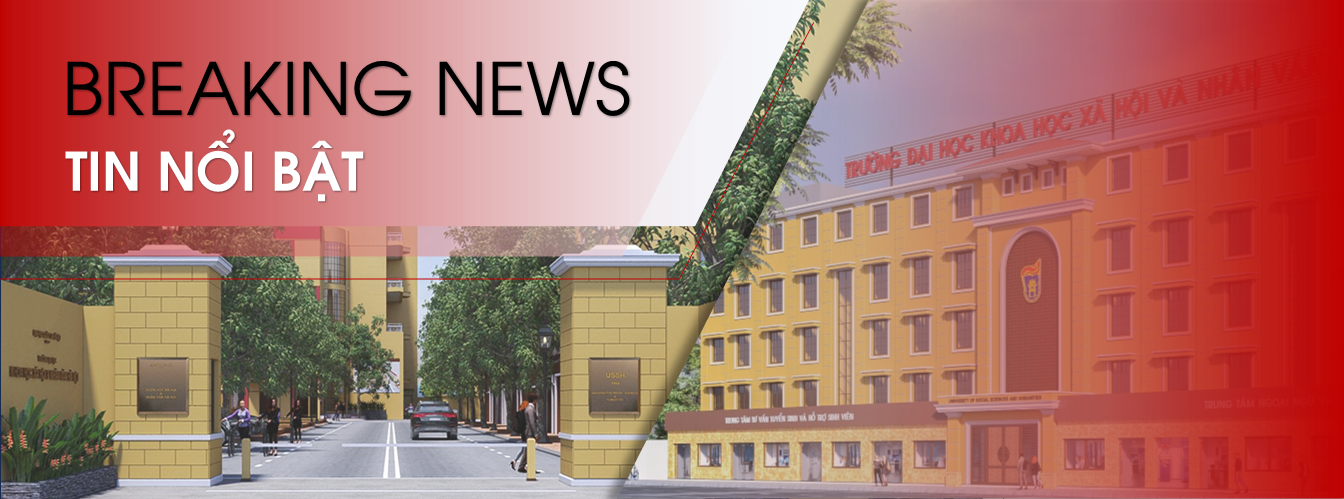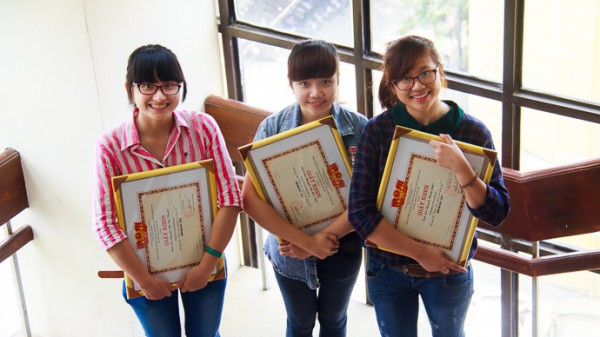Among the more than 800 student research projects in the 2012-2013 academic year, quite a few projects focused on students as the research subjects, addressing issues related to their lives, studies, work, and activities of the Youth Union and Student Association. The following five outstanding projects received awards from the Youth Union of the University of Social Sciences and Humanities.
* Dinh Thi Ha (K55 History Education): Research on the influence of Korean culture on students of the University of Social Sciences and Humanities (First Prize)
The Korean Wave is a cultural phenomenon in the early 21st century, aiming to promote the image and culture of South Korea, with Vietnam being particularly influenced. Student Dinh Thi Ha conducted a survey on the current state of the influence of Korean culture on students at the University of Social Sciences and Humanities. The report shows that the voluntary adoption of Korean culture in Vietnam occurs through various channels: trade, media, television, films, and the internet. For students at the University of Social Sciences and Humanities, the areas of greatest interest are Korean cinema, music, and fashion.
The increasing influence of Korean culture on young people has also given rise to diverse opinions: 149 students (38%) believe it is entirely natural and in line with the general trend of integration; 128 students (32%) believe traditional values are being lost; and 24 students (6%) believe there is no influence. According to the assessment, 316 students (80%) believe that Korean culture is only compatible with Vietnamese culture in certain areas; 198 students (50%) believe that selective adoption is necessary, while 121 students (31%) believe that adoption should be followed by selective adoption. This raises the question of whether students' opinions are a matter of perception or subjective viewpoint. This will help address the issue of how students should approach adopting Korean culture. From perception to lifestyle, that is the shortest path to personal change.
* Bui Thi Thu Ha, Bui Thi Thu Trang (K56 Psychology): The active participation of students in the Youth Union and Student Association at the University of Social Sciences and Humanities (Third Prize).
Through research and surveys, the authors concluded that students at the University of Social Sciences and Humanities participate in Youth Union and Student Association activities at an average level. Students are most active in activities supporting academics and scientific research, followed by political and ideological activities, and finally, cultural, sports, and community service activities. Male students participate more actively than female students. First-year students participate more actively than second and third-year students. Among the faculties, students from the Faculty of Journalism and Communication and the Faculty of History are considered the most dynamic and active.
The authors recommend that the university should enhance student benefits and establish mandatory regulations regarding student responsibilities when participating in general activities. The Youth Union and Student Association should improve the timely and efficient dissemination of information about general activities; innovate activities to make them more diverse, engaging, and practical; and promptly commend and reward students with outstanding achievements.
* Ngo Thi Hoa (K55B Management Science): The current situation of students at the University of Social Sciences and Humanities, Vietnam National University, Hanoi infringing on copyright of works on the Internet (Third Prize).
The author surveyed two groups of students: those who had studied intellectual property rights (IPR) and those who had not. The conclusion drawn was that only the group of students who had studied IPR had a correct understanding of copyright, but their understanding of the right to copy works was very limited. Conducting a survey on the reality of students infringing on copyrights on the internet with three groups of works (in written, audio, and visual form), the author found that the number of students who had studied IPR infringing on copyright was many times lower than those who had not, and that audio works were the most commonly copied.
Thus, the reality is that students violating copyright on the internet is very common, and if not addressed promptly, it will have serious consequences, violating the law and ethical standards.
The report asserts that a major cause of these violations is the limited dissemination of intellectual property (IP) regulations, the lack of detailed and effective penalties, and the absence of IP training programs for all students. Furthermore, students lack a proper understanding of copyright and the right to copy works, and do not have the habit of paying for the use of online products.
The authors also suggested that the university implement general disciplinary measures for students who violate intellectual property rights, provide opportunities for students to access knowledge about intellectual property rights, and establish a specialized committee within the university to address the issue of plagiarism. Students, for their part, need to proactively learn about intellectual property rights to develop a correct understanding, cultivate independent thinking, and avoid reliance on others.
* Bui Thi Hai, Nguyen Thi My Ly (K55 Vietnamese Studies and Vietnamese Language): The clothing culture of young people through a survey of the clothing styles of students at the University of Social Sciences and Humanities (Third Prize)
The strong trend of integration and globalization has profoundly impacted all aspects of society, affecting all social strata, especially young people. The changes in young people's aesthetic perceptions, including their clothing culture, are clear evidence of this impact. The question this study focuses on is: How do young people dress today? What do they consider beautiful, and how do they express this through their clothing? And where do traditional values and cultural identity stand in the context of today's rapid globalization?
The authors surveyed and drew conclusions about the current state of students' dressing styles, investigating the causes of these issues. The current state of students' dressing is reflected in various aspects: the meaning of clothing choices, perceptions of clothing, opinions on clothing, and students' awareness of clothing… The report affirms that, alongside beautiful and traditional fashion trends, there is still the phenomenon of students dressing sexily, inappropriately, or dressing to show off their status. To overcome this phenomenon, intervention from the school, self-awareness from students, and feedback from peers are needed. The authors send a message to students: “Enhance your style with fashion, but don’t let fashion diminish your personality and beautiful image in the eyes of others.” Integrate but do not dissolve into the culture of clothing in order to preserve cultural identity in the current trend of globalization.
* Nguyen Thi Thu Thanh, Nguyen Thi Mai Anh, Nguyen Hanh Linh (K55 Sociology): Social capital of students through Youth Union and Student Association activities (Third Prize)
Social capital is an essential asset for students to succeed in society. For students, the simplest and most effective way to cultivate social capital is to actively participate in youth union and student association activities. With this in mind, this research topic aims to investigate: How is students' social capital inherited and developed through youth union and student association activities?
The authors concluded that the activities of the Youth Union and Student Association at the University of Social Sciences and Humanities are fundamental and favorable factors contributing to the development of social capital for students. The social capital that students inherit from their demographic characteristics and family social relationships never reaches a level of equality; individuals in different families inherit different sources of capital. Students who actively participate in Youth Union and Student Association activities will develop their inherited social capital, while those with less substantial social capital can also develop it through these activities, overcoming inequality in social capital and even surpassing students who already possess relatively large inherited capital. The authors also suggested that the University, the Youth Union, the Student Association, and the students themselves should implement solutions to help students enhance their social capital while they are still in school.







